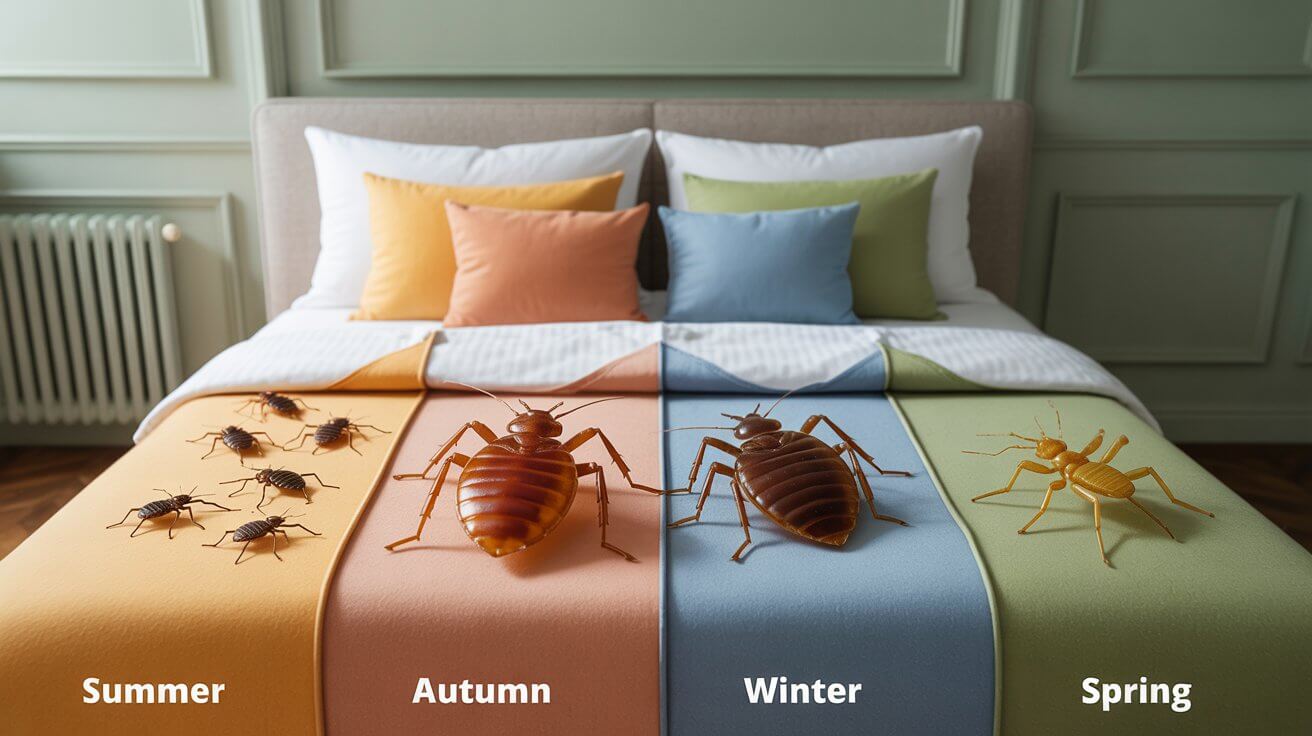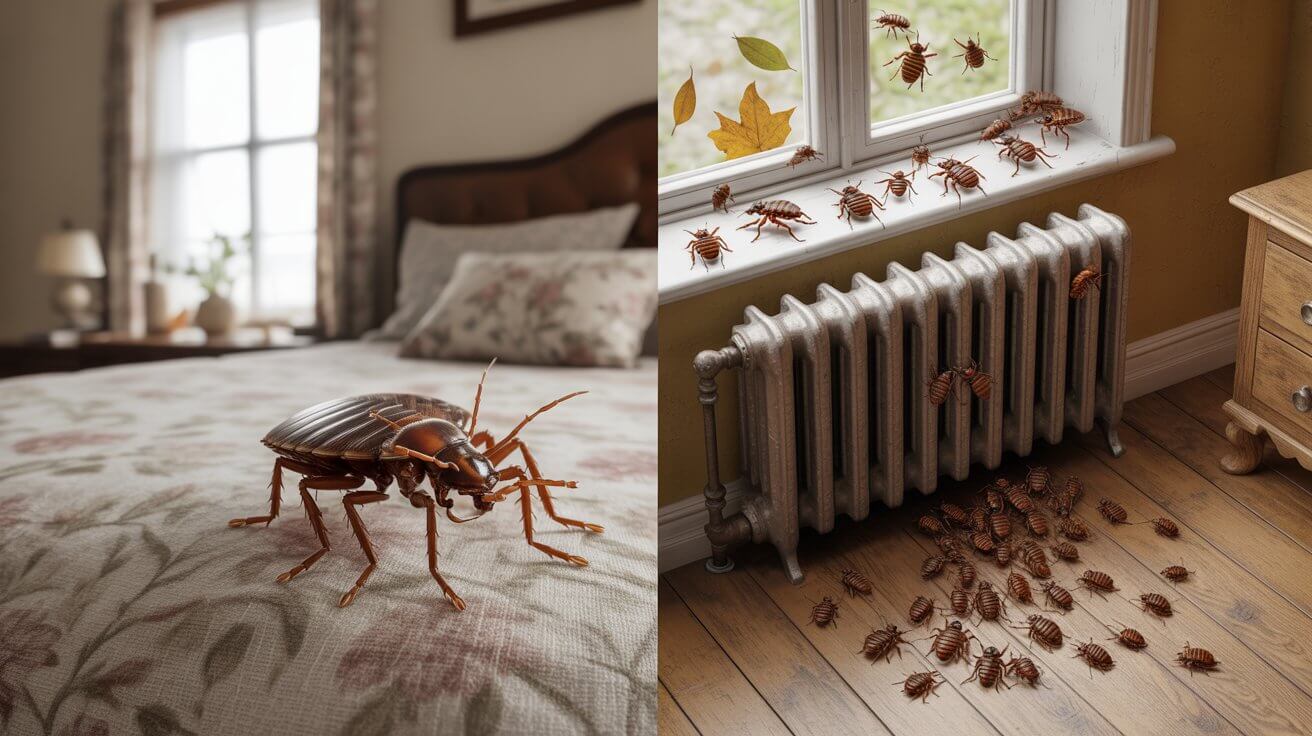Many UK homeowners assume bedbugs are only a summer problem, but these resilient pests can remain active throughout the year. Understanding their seasonal patterns helps you stay vigilant and take appropriate preventive measures regardless of the time of year.
Bedbugs are opportunistic feeders that adapt remarkably well to indoor environments. While their activity levels do fluctuate with temperature and breeding cycles, they never truly disappear during colder months. This means UK residents need to remain alert to potential infestations year-round, especially given the country’s mild climate and widespread use of central heating.
What Time of Year are Bedbugs Most Active in The UK Homes?
Bedbugs show peak activity during the warmer months, typically from late spring through early autumn (May to September). However, their activity patterns in the UK are more complex than simple seasonal changes.
Seasonal activity patterns of bedbugs
During spring and summer, bedbugs experience accelerated metabolism and reproduction rates. Warmer temperatures trigger faster development cycles, meaning eggs hatch more quickly and nymphs mature into breeding adults sooner. This creates larger populations that require more frequent blood meals.
Autumn sees continued activity as bedbugs prepare for winter survival. They may feed more aggressively during this period to build energy reserves. Winter brings reduced activity levels, but bedbugs don’t become completely dormant in heated indoor environments.
| Season | Bedbug Behaviour |
| Spring & Summer | Faster metabolism, quicker egg hatching, and rapid population growth due to warmer temperatures. |
| Autumn | Continued feeding, often more aggressive to build reserves for winter survival. |
| Winter | Reduced activity but not dormant; indoor heating keeps them semi-active. |
Why temperature plays a major role in their behaviour
Temperature directly affects bedbug physiology and behavior. At temperatures above 70°F (21°C), bedbugs become more active, feed more frequently, and reproduce faster. Their digestive processes speed up, requiring blood meals every 5-7 days instead of the 10-14 days typical in cooler conditions.
Below 50°F (10°C), bedbugs enter a state of reduced activity but don’t die off completely. They can survive temperatures as low as 46°F (8°C) for extended periods, though their development and reproduction slow dramatically.
Do Bedbugs Hibernate in the UK Winter?
Bedbugs don’t hibernate in the true biological sense, nor do they die off during UK winters. Instead, they enter a state called diapause, a period of reduced metabolic activity that helps them survive unfavorable conditions.
How bedbugs survive during colder months
During diapause, bedbugs can survive without feeding for several months. Their metabolism slows down significantly, allowing them to conserve energy and survive on stored nutrients from previous blood meals. This survival mechanism enables them to wait out harsh conditions until temperatures become favorable again.
Adult bedbugs are particularly hardy and can survive up to a year without feeding under the right conditions. This remarkable survival ability means that even if you don’t see evidence of bedbugs during winter, dormant populations may be present in your home.
Indoor environments and their role in winter survival
UK homes provide ideal winter refuges for bedbugs. Central heating maintains temperatures that prevent bedbugs from entering deep diapause, keeping them semi-active throughout winter. Carpeted areas, upholstered furniture, and bedding provide insulation and hiding spots that protect bedbugs from temperature fluctuations.
The relatively mild UK climate, combined with heated indoor spaces, creates year-round conditions suitable for bedbug survival. This is why professional pest controllers report infestations in every season.
Can You Get Bedbugs in The UK in Winter?
Yes, you can definitely get bedbugs during UK winters. Winter infestations occur through the same pathways as summer ones travel, second-hand furniture, or migration from neighboring infested properties.
Real cases of winter infestations
In East London and Essex, pest control companies report consistent calls for bedbug treatments, even in winter months. Hotels, student accommodations, and residential properties all experience winter infestations. The misconception that bedbugs are only active in summer can lead to delayed detection and treatment.
Winter travel, particularly around holiday periods, creates opportunities for bedbug transfer. People staying in infested accommodations can unknowingly bring bedbugs home in luggage or clothing, regardless of the season.
Why winter bedbug problems shouldn’t be ignored
Ignoring potential bedbug signs during winter allows populations to establish themselves and grow. While reproduction rates are slower in winter, bedbugs can still breed in heated homes. By spring, a small winter population can explode into a major infestation as temperatures warm up.
Early detection and treatment during winter months is often more effective because populations are typically smaller and less widespread throughout the property.
Are Bedbugs Worse in The Summer Months in The UK?
Summer conditions do make bedbug problems more severe and noticeable. Higher temperatures and increased travel during summer holidays create perfect conditions for rapid population growth and new infestations.
Warmer weather and faster breeding cycles
Summer temperatures accelerate every aspect of the bedbug lifecycle. Eggs that might take 10-14 days to hatch in cooler conditions can develop in just 6-8 days during warm weather. Adult bedbugs become more active, feeding more frequently and mating more regularly.
This acceleration means that summer infestations can quickly become overwhelming if not addressed promptly. What starts as a few bedbugs in June can become hundreds by August under optimal conditions.
Why summer infestations spread more rapidly
Increased summer travel facilitates bedbug spread between properties and regions. Holiday accommodations experience higher turnover rates, increasing the likelihood of bedbug introduction and transfer. Warmer weather also makes bedbugs more mobile within properties, helping them spread to new areas more quickly.

Does Central Heating Make Bedbugs More Active in The UK?
Central heating systems significantly impact bedbug activity by maintaining consistent indoor temperatures that keep them active throughout winter. Most UK homes maintain temperatures between 68-72°F (20-22°C), which is ideal for continued bedbug activity.
Heating systems and indoor temperatures
Radiators, underfloor heating, and warm air systems create microclimates that bedbugs exploit. Areas near heat sources often harbor larger bedbug populations because the warmth supports faster development and more frequent feeding.
Bedrooms with radiators provide particularly attractive conditions, combining warmth with regular access to sleeping hosts. This is why bedroom infestations often persist and worsen during winter months in heated homes.
Impact on year-round infestations
Central heating effectively eliminates the natural population control that cold weather might provide in unheated spaces. This creates conditions for continuous bedbug activity, making UK homes vulnerable to persistent, year-round infestations.
What Time of Night are Bedbugs Most Active?
Bedbugs are nocturnal pests, predominantly active during the night when their human hosts are at rest. Their behavior has evolved to maximize feeding opportunities while reducing the chance of detection.
Typical feeding times
Bedbugs tend to feed between midnight and 5 a.m., with peak feeding often occurring around 2-3 a.m. This timeframe coincides with the deepest stages of human sleep, making it less likely for people to notice or disrupt their activity. During these hours, bedbugs emerge from their hiding spots, which are typically close to their host, such as mattress seams, bed frames, and nearby furniture.
Why bedbugs prefer night activity
There are several reasons why bedbugs favor nighttime activity. Firstly, humans are less mobile while asleep, providing bedbugs with a stationary host to feed on for an extended period. Secondly, reduced light levels during the night help bedbugs remain hidden, as they are highly vulnerable to detection and extermination in brightly lit conditions. This nocturnal behavior ensures they can feed efficiently and safely before retreating to their hiding spots.
Early Signs of Bedbugs in Your UK Home
The early signs of a bedbug infestation can be subtle, but recognizing them promptly is essential to address the problem before it worsens. These signs can appear both in your environment and on your body.
Physical signs on bedding and furniture
Carefully inspect your bedding and furniture for small, rust-colored stains, which are often a result of crushed bedbugs or their excrement. You might also find tiny, white eggs or shed skins, as bedbugs molt during their lifecycle. Another telltale sign is the presence of live bedbugs, which are small, oval-shaped, and reddish-brown. They often hide in mattress seams, headboards, cracks in furniture, or baseboards during the day.
Symptoms on your skin and sleep disturbances
On your skin, bedbug bites are typically small, itchy, and appear in clusters or lines. These bites may cause redness and swelling and are usually found on areas of the body exposed during sleep, like the arms, neck, or face. Additionally, bedbug activity and feeding can lead to sleep disturbances, leaving you feeling tired or irritable from restless nights.
Where Are The Most Common Places to Pick up Bedbugs in The UK?
Bedbugs are excellent hitchhikers, making it easy for them to travel between locations. Understanding where you’re most likely to encounter them in the UK can help reduce the risk of bringing these pests into your home.
Hotels, public transport, and second-hand furniture
Hotels and other accommodations are among the most common places to pick up bedbugs, as these establishments host frequent guests, providing ample opportunities for infestations. Similarly, public transport, such as buses and trains, can transfer bedbugs via upholstered seats and travelers’ luggage. Be cautious when acquiring second-hand furniture, as it may harbor bedbugs hidden in upholstery or wooden cracks.
Urban hotspots and travel-related risks
Bedbug infestations are more prevalent in urban areas, where population density increases the likelihood of their spread. Travel-related risks, such as visiting tourist hotspots or staying in shared accommodations, further contribute to the spread of bedbugs. Vigilance while traveling, including inspecting sleeping areas and luggage, is crucial to prevent bringing these pests back home.
How Can I Prevent Bringing Bedbugs Home After a UK Holiday?
Taking proactive steps to prevent bedbugs from hitching a ride home after a UK holiday can save you stress and inconvenience. By practicing simple precautionary measures, you can minimize the risk of an infestation.
| Step | Action |
| Accommodation check | Inspect mattress seams, headboard, and furniture. |
| Luggage placement | Use luggage racks, avoid floor/bed. |
| Protective covers | Use bedbug-proof suitcase covers. |
| After trip | Wash clothes at high heat, vacuum suitcase, store in sealed bag. |
Simple precautionary steps when traveling
When traveling, always inspect your accommodation upon arrival. Check the mattress seams, headboard, and furniture for signs of bedbugs, such as dark spots or shed skins. If you find any evidence, request a different room or move to another hotel. Store your luggage on a luggage rack rather than on the floor or bed, and consider using bedbug-proof covers for suitcases. Carry a flashlight to assist with inspections in dimly lit areas.
Inspecting luggage and clothing after trips
After returning home, inspect your luggage and belongings carefully. Unpack your clothes directly into a washing machine, washing them on the highest temperature setting appropriate for the fabric. For items that cannot be washed, consider placing them in a hot dryer for at least 30 minutes. Vacuum your suitcase thoroughly and, if possible, store it in a sealed plastic bag or outside the living area to prevent unnoticed bedbugs from spreading indoors.
What Should I Do if I Find Bedbugs in My UK Home?
Discovering bedbugs in your home can be distressing, but quick action can help contain the problem. Depending on the severity of the infestation, you may opt for DIY methods or seek professional assistance.
DIY measures for small infestations
For minor infestations, start by thoroughly cleaning the infested areas. Wash infested fabrics and linens in hot water, and vacuum mattresses, furniture, and crevices. Dispose of the vacuum bag immediately in a sealed plastic bag. Encase mattresses and box springs in bedbug-proof covers to trap and isolate the pests. Use diatomaceous earth or other non-toxic pest control powders to target crevices and cracks, ensuring to follow manufacturer instructions carefully. Monitor the situation regularly to confirm the infestation is under control.
When to call professional pest control
If the infestation persists or appears widespread, it is essential to contact a licensed pest control professional. Experts have specialized tools and treatments, such as heat treatments or insecticides, that are more effective for severe cases. Delaying professional intervention can allow the infestation to spread, making eradication more difficult and costly. Always research and hire a reputable pest control service to ensure the issue is resolved thoroughly.
Stay Vigilant All Year Round
Bedbugs remain a year-round threat in the UK due to mild climate conditions and widespread central heating. While summer brings peak activity and faster reproduction, winter doesn’t eliminate bedbug populations. Understanding these patterns helps you maintain appropriate vigilance and respond quickly to signs of infestation regardless of the season.
Regular inspection of sleeping areas, prompt investigation of unexplained bites or spots, and professional treatment when needed are your best defenses against these persistent pests throughout the year.
If you’re worried about bedbugs in Essex or East London, Saxon Pest Management offers safe, discreet, and effective bedbug treatments year-round. Contact us today for fast help.






















